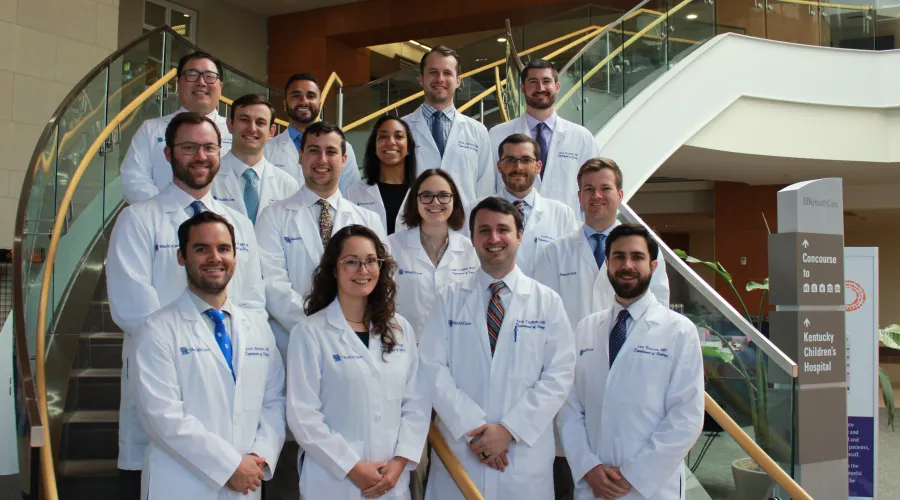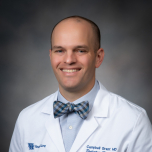
Residency
The UK urology residency program is a five year program, consisting of an initial internship year in general surgery, with four months on the urology service, followed by four years of urology. The residency is compiled of three trainees per year. The goal of the program is to produce an exceptionally well-trained urologist qualified to enter either academic urology or private practice. The residency has allowed for graduates to obtain fellowships or enter directly into practice with confidence. The residency program uses adjoining facilities at University of Kentucky Hospital and Veterans Affairs Medical Center (VAMC).
Residency Program Director

Campbell M Grant, MD
Positions Held:
- Assistant Professor Pediatric Urology (Pediatric Urology Division)
GME Program Coordinator

Associate Program Director

Resident Application
Three residents are accepted each year, primarily from fourth-year medical school candidates but occasionally from surgical interns or residents from other training programs. The department participates in the American Urological Association (AUA) matching program. Selection of candidates is made on the basis of medical school transcripts, National Board scores, letters of recommendation, and a personal interview. Final ranking is by faculty consensus. The updated timeline for the 2024-2025 Urology Residency Match will be followed as directed by the Society of Academic Urologists (SAU) and the Association of American Medical Colleges (AAMC). Interviews are by invitation and are limited to medical school graduates in the upper half of their medical school classes who have also generally scored at least 220 on Part I of their National Boards.
For more information, check our Application Process page.
Visa Sponsorship
To be eligible for employment as UK resident or fellow, GME residents and fellows must be citizens of the United States or hold a permanent immigration visa (‘green card’), Employment Authorization Document (EAD), or hold a visa. GME physician residents and fellows who require visas are sponsored on J-1 visas 15 through the Educational Commission for Foreign Medical Graduates (ECFMG). GME residents and fellows are sponsored on H-1B visas only in rare cases with extenuating circumstances. H-1B visas require justification from the applicant and program director, with both the candidate and the program responsible for associated individual and institutional fees. Non-physician GME residents and fellows can train on an Optional Practical Training (OPT) visa. Visa issues or questions should be referred to the GME office.
Visa Sponsorship
To be eligible for employment as UK resident or fellow, GME residents and fellows must be citizens of the United States or hold a permanent immigration visa (‘green card’), Employment Authorization Document (EAD), or hold a visa. GME physician residents and fellows who require visas are sponsored on J-1 visas 15 through the Educational Commission for Foreign Medical Graduates (ECFMG). GME residents and fellows are sponsored on H-1B visas only in rare cases with extenuating circumstances. H-1B visas require justification from the applicant and program director, with both the candidate and the program responsible for associated individual and institutional fees. Non-physician GME residents and fellows can train on an Optional Practical Training (OPT) visa. Visa issues or questions should be referred to the GME office.
Resident Benefits
Resident Benefits include, but are not limited to, lab coats, retirement match, life insurance, and meal allowances. Find out more on our Resident Benefits page.
Additionally, the program provides educational funds to help offset the initial cost of the purchase of surgical loupes and lead.
Resident Benefits
Resident Benefits include, but are not limited to, lab coats, retirement match, life insurance, and meal allowances. Find out more on our Resident Benefits page.
Additionally, the program provides educational funds to help offset the initial cost of the purchase of surgical loupes and lead.
Residency Schedule
The urology residency program is designed to provide a graded and progressive level of cognitive and technical skills for the resident to achieve a well-rounded experience in all of the domains of urology. Community practice rotations begin in year 3.
PGY-1
The residents are expected to acquire basic skills in patient care, including pre-operative and post-operative evaluation and management. Basic surgical principles and skills should be learned as well. Each of the residents will spend 4 months in urology and the other 8 months will be spent in a variety of surgical specialties, including, but not limited to, surgical critical care, colorectal surgery, surgical oncology, transplant, and pediatric surgery.
PGY-1
The residents are expected to acquire basic skills in patient care, including pre-operative and post-operative evaluation and management. Basic surgical principles and skills should be learned as well. Each of the residents will spend 4 months in urology and the other 8 months will be spent in a variety of surgical specialties, including, but not limited to, surgical critical care, colorectal surgery, surgical oncology, transplant, and pediatric surgery.
PGY-2
The resident is expected to begin to develop a broad base of knowledge of urologic anatomy, physiology, and pathology. They are also expected to learn the basic diagnostic procedures performed by urologists. The hospital rotation will provide the opportunity for residents to improve their patient care skills and begin learning open, endoscopic, and laparoscopic urologic procedures. During this year, the resident should develop areas of interest for scholarly activity during the remainder of the training program. The resident rotates on the UK pediatric urology service (4 months), VA (2 months), and back to UK for endourology (2 months), and flex service (4 months). The flex service’s primary responsibility is Good Samaritan consults.
PGY-2
The resident is expected to begin to develop a broad base of knowledge of urologic anatomy, physiology, and pathology. They are also expected to learn the basic diagnostic procedures performed by urologists. The hospital rotation will provide the opportunity for residents to improve their patient care skills and begin learning open, endoscopic, and laparoscopic urologic procedures. During this year, the resident should develop areas of interest for scholarly activity during the remainder of the training program. The resident rotates on the UK pediatric urology service (4 months), VA (2 months), and back to UK for endourology (2 months), and flex service (4 months). The flex service’s primary responsibility is Good Samaritan consults.
PGY-3
This year focuses on refinement of basic diagnostic and surgical skills as well as expanding each resident’s cognitive abilities. Each resident serves as junior resident at the VA and UK adult urology services. During the Pediatric Urology rotation, the resident is expected to learn diseases and procedures that are specific to this area of subspecialty, including out-patient and in-patient activities. The resident rotates on the UK pediatric urology service (2 months), VA (2 months), and back to UK for reconstructive (4 months), oncology (2 months), and endourology (2 months).
PGY-3
This year focuses on refinement of basic diagnostic and surgical skills as well as expanding each resident’s cognitive abilities. Each resident serves as junior resident at the VA and UK adult urology services. During the Pediatric Urology rotation, the resident is expected to learn diseases and procedures that are specific to this area of subspecialty, including out-patient and in-patient activities. The resident rotates on the UK pediatric urology service (2 months), VA (2 months), and back to UK for reconstructive (4 months), oncology (2 months), and endourology (2 months).
PGY-4
During this year, the resident will receive broad exposure to more attending urologists and gain greater proficiency in complex diagnostic and surgical procedures. Areas such as lithotripsy, endourology, and laparoscopy will be emphasized. A wide experience in major open operative cases will also be expected. The resident will spend 4 months in Pediatrics, 4 months in Community Practice, 2 months in Endourology, and 2 months in Reconstructive Urology.
PGY-4
During this year, the resident will receive broad exposure to more attending urologists and gain greater proficiency in complex diagnostic and surgical procedures. Areas such as lithotripsy, endourology, and laparoscopy will be emphasized. A wide experience in major open operative cases will also be expected. The resident will spend 4 months in Pediatrics, 4 months in Community Practice, 2 months in Endourology, and 2 months in Reconstructive Urology.
PGY-5
The Chief Resident at each hospital, UK and VA, will be responsible for the administrative aspects of the daily coordination of in-patient and out-patient care by the resident staff as well as coordinating conference schedules. This will be done under the supervision of the Program Director and the faculty.
Each Chief Resident will gain extensive experience in the more complex procedures as well as broadening her/his overall knowledge base. Each Chief will spend time at the VA (4 months), in oncology (4 months), in reconstructive (2 months), and in endourology (2 months).
PGY-5
The Chief Resident at each hospital, UK and VA, will be responsible for the administrative aspects of the daily coordination of in-patient and out-patient care by the resident staff as well as coordinating conference schedules. This will be done under the supervision of the Program Director and the faculty.
Each Chief Resident will gain extensive experience in the more complex procedures as well as broadening her/his overall knowledge base. Each Chief will spend time at the VA (4 months), in oncology (4 months), in reconstructive (2 months), and in endourology (2 months).